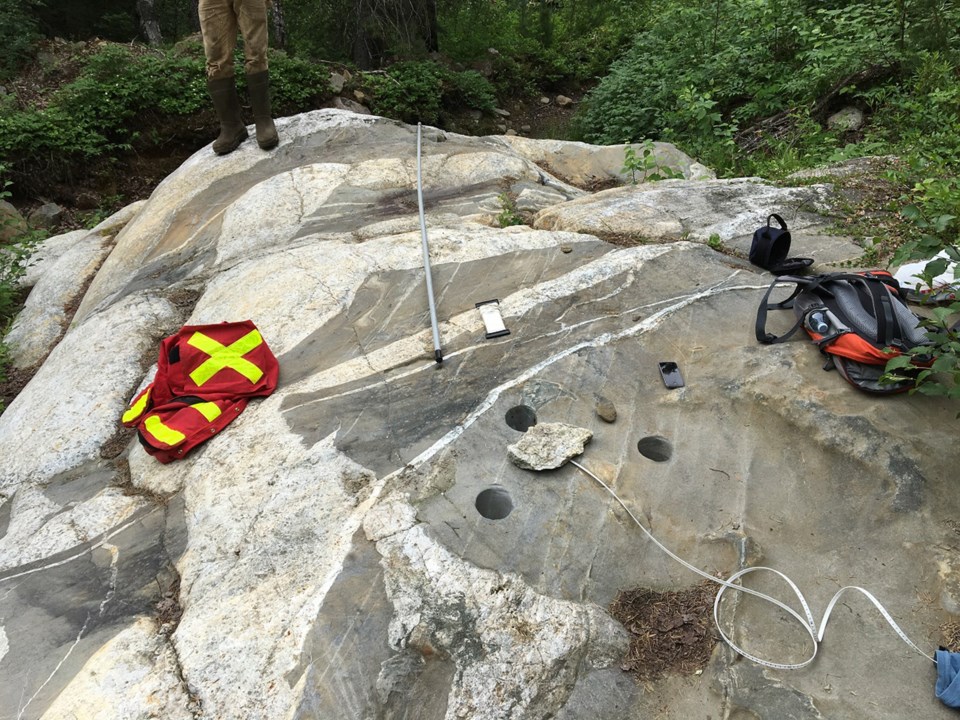A northwestern Ontario lithium exploration outfit said a new technical report makes a positive case to build a mine and processing mill in the Nipigon area.
Rock Tech Lithium released the results of a pre-feasibility study to advance its Georgia Lake spodumene project, located just off Highway 11 between Beardmore and Nipigon.
The company hasn’t made a final construction decision yet but has previously indicated it would like to start mine construction in the second quarter of 2023 and be in commercial production late next year or in early 2024.
The study puts the mine's operating life at nine years, the first four as an open pit, the remaining five as an underground operation. Exploration continues at Rock Tech’s 1,042-hectare property to enlarge the deposit and find more mineral resources.
The production of the processed spodumene concentrate at the site over that span will be an average of 100,000 tonnes a year.
Spodumene is the most widely used lithium because of its high lithium content in the rock.
The cost for construction is US$192.2 million with sustaining capital costs of US$98.5 million, including the closure costs of the mine. .
Rock Tech, a Vancouver junior mining company with European ties, bills itself as a clean tech company that’s “on a mission” to produce refined lithium hydroxide for the battery manufacturers in the electric vehicle sector.
The company claims it’s pursuing a “vertically integrated strategy,” meaning it intends to be a miner, processor and supplier of a battery-grade material to the automakers.
Though they haven’t mined a tonne of rock yet, the company has been signing of flurry of downstream deals with potential customers ahead of time. Back in August, Rock Tech signed a lithium supply deal with Mercedes Benz.
Instead of having the spodumene concentrate from Georgia Lake refined in northwestern Ontario, Rock Tech made the decision to ship the crushed material overseas to a proposed company-owned and operated refining facility – called a converter – that Rock Tech intends to build in Guben, Germany.
Rock Tech considers the consumer market for electric vehicles in Europe to be more advanced than in North America. The Guben refinery will be capable of processing 15,000 tonnes per year, a good portion of it coming from Georgia Lake, the rest coming from material bought on the world market through its commodities broker.
But as a backup plan, the global situation being what it is, Rock Tech said it isn’t ruling out having its northwestern Ontario-mined lithium processed in North America or selling it to a refiner somewhere else.
To date, the mineral reserves at Georgia Lake sit at 7.33 million tonnes of lithium oxide, grading at 0.82 per cent. The company measures its mineral resources at 10.6 million tonnes, grading at 0.88 per cent in the indicated category and 4.6 million tonnes at 1.00 per cent on the inferred column.
A resource represents a ‘best guess’ by a qualified professional of the discovered and undiscovered amount of a geological commodity in a deposit. A reserve is a more defined resource in the ground, with a known size that can be extracted at a profit.
Indicated and inferred resources is the degree of confidence in the amount of minerals, with measured being the higher category and inferred being the lower.
Rock Tech said the metallurgical test work done of samples of spodumene concentrate makes it ideal for refining into battery-grade lithium hydroxide for the car companies, which pleased company CEO Dirk Harbecke in a news release.
"These results support the integration of Georgia Lake with the downstream conversion industry, where we have been building strong partnerships and extensive know-how. The encouraging results also demonstrate that we are well positioned to explore potential fields of collaboration in the North American and European EV supply chain.”
The company said it plans to move to the next stage of project evaluation with a feasibility study to better fine-tune its plans for Georgia Lake.




